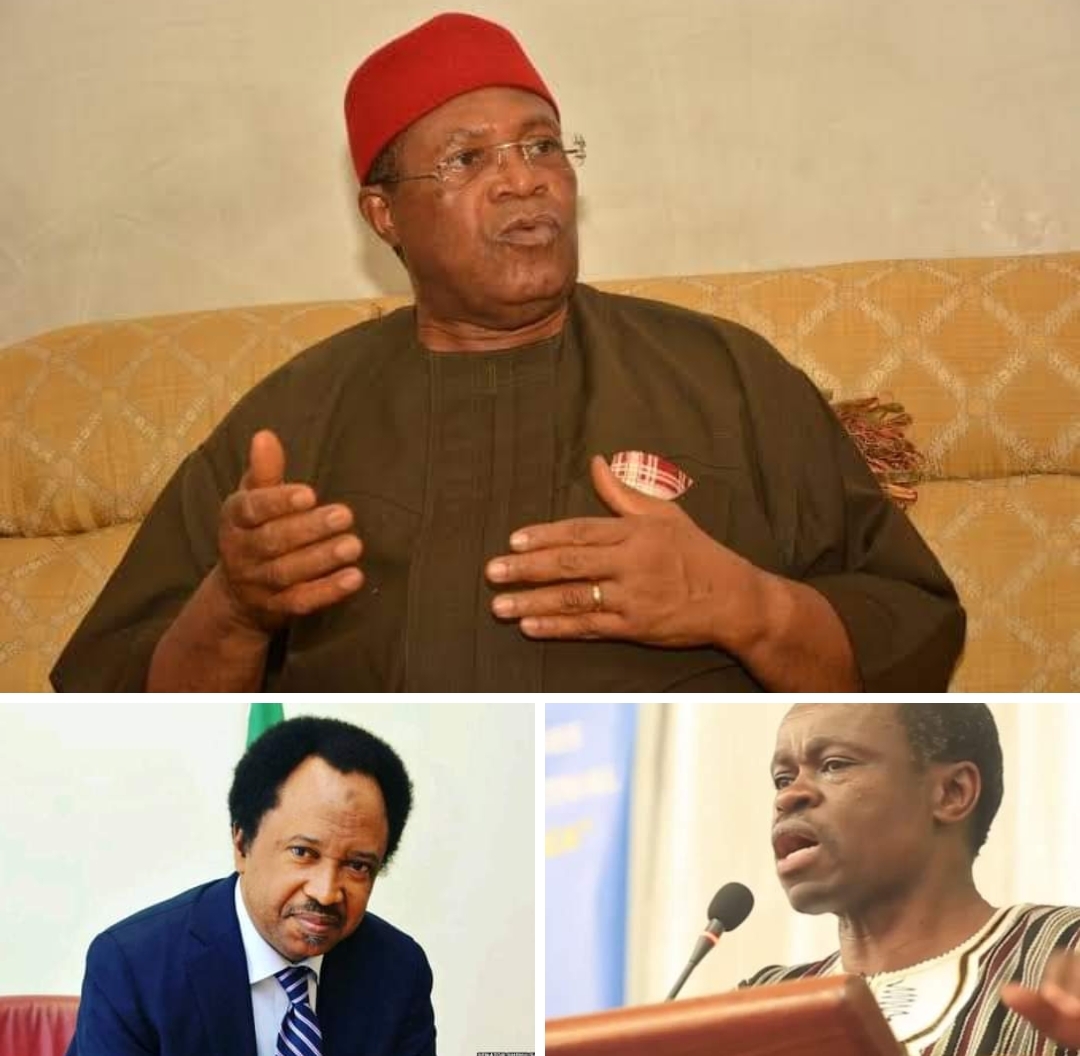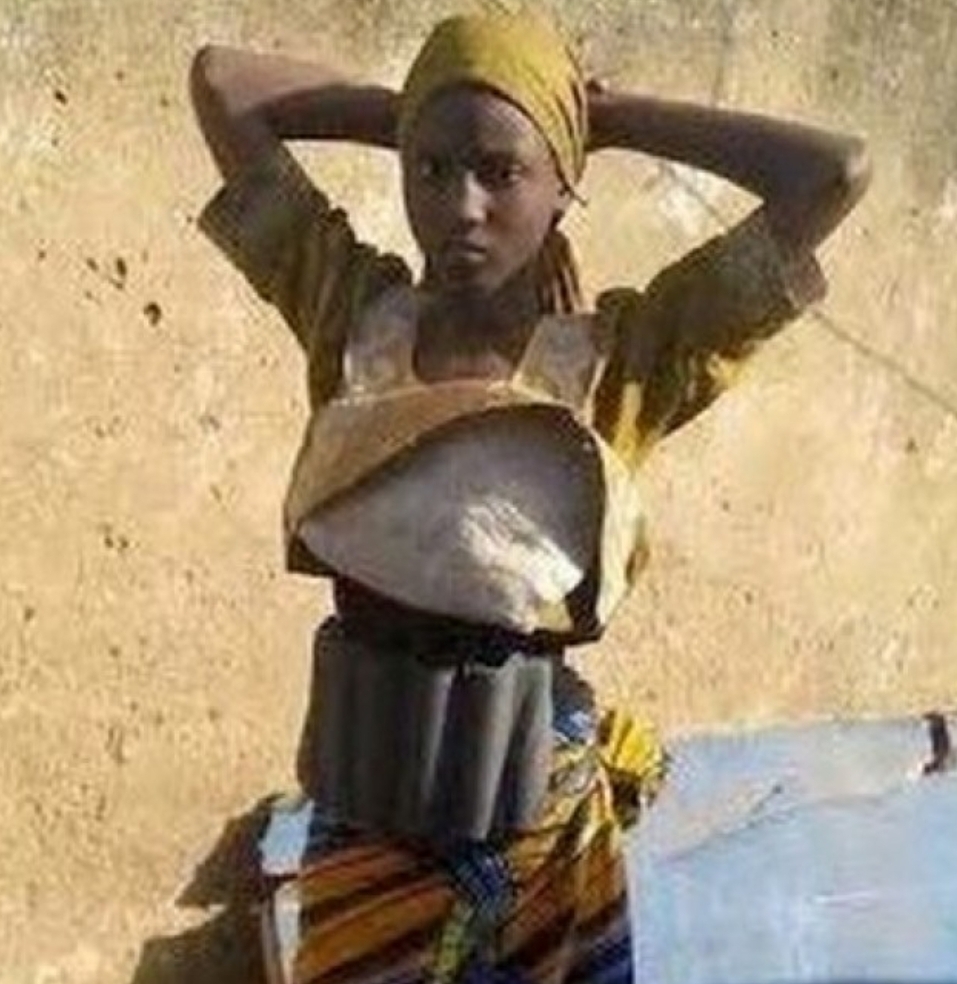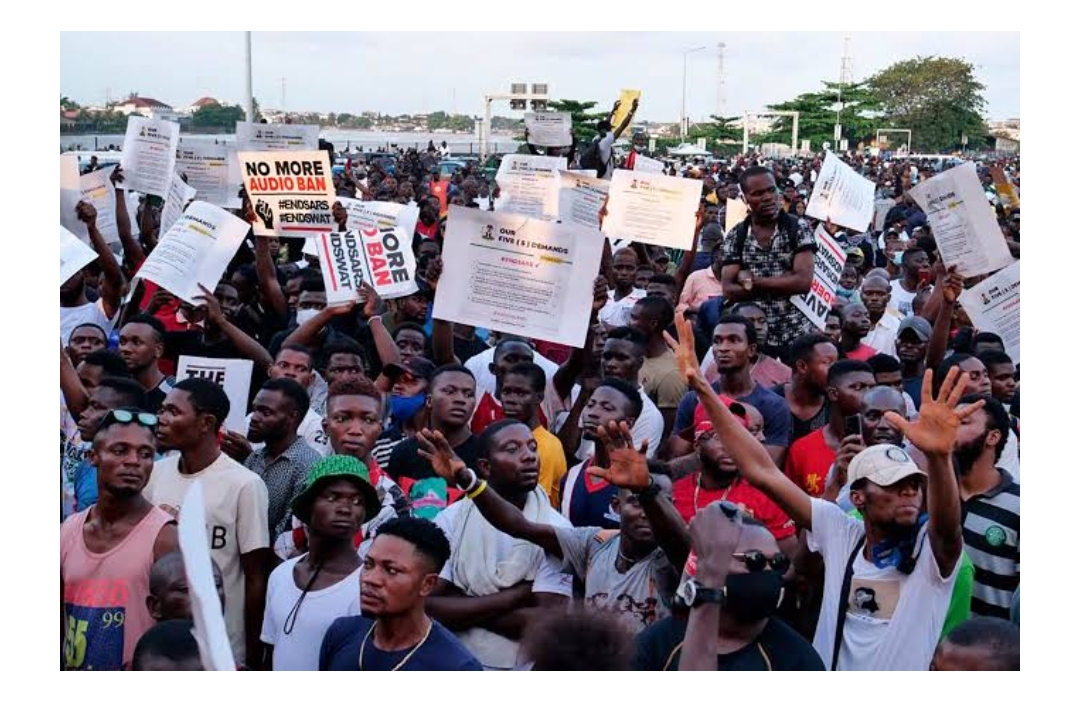The governors of the states in Nigeria’s northeast have been helpless in the face of banditry and terror since they assumed office. Leadership SCORECARD’S Collin Kainene weighs in on their performances in the light of the social contract they signed with Nigeria, how they have fared in the face of the forces which have given life to one of Africa’s biggest humanitarian challenges.
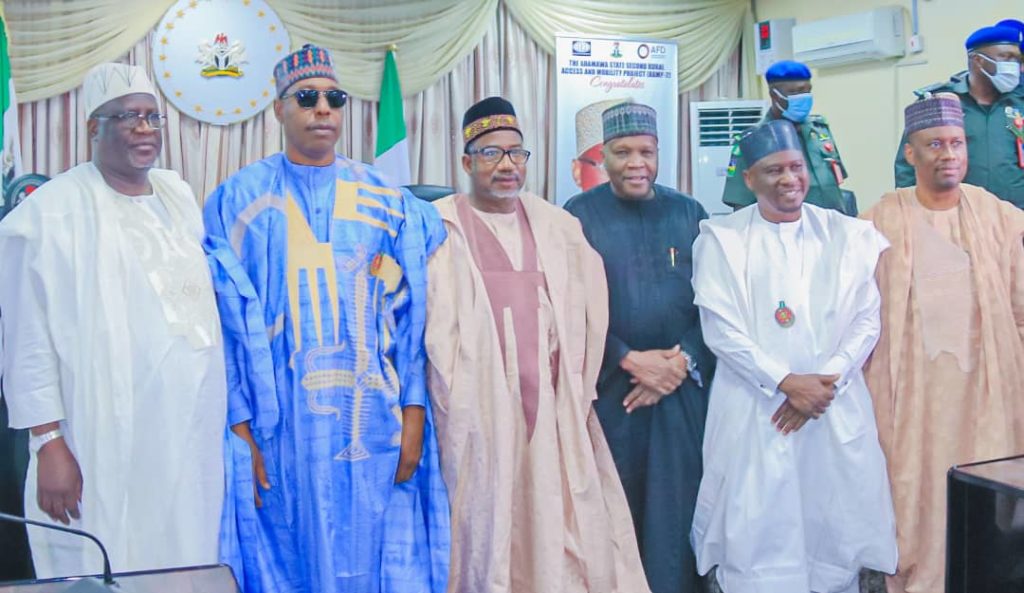
Adamawa: Is Umaru Fintiri Worth the Hype?
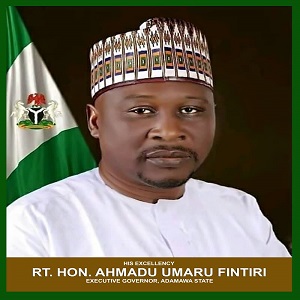
Infrastructure:
While much cannot be said of Fintiri’s time in office, his urban renewal drive has been his administration’s face-saving factor.
In his second year in office, Governor Umar Fintiri has rebranded the Ribawa Central Market in Mubi to the first ever International Border Market in the whole northern Nigeria with 8,000 shops, 200 houses, 3000 stores, 120 toilets, bank, police post, mini-mart, standard hospital, mosque and church.
Within few months of assuming office, Governor Fintiri flagged off work on 18.08km Jimeta township roads at over ₦5bn covering Benue, Kaduna, Lusaka, Abeokuta and Ndafora streets all within NEPA area, totaling 2.1km; Philip Maken and Links off Army Barracks Road up to Karewa, 2.54km; Lagos Street off Army Barracks links Army Barracks, 1.5km; Falu Road linking Karewa Extension, 2.31km; Bachure Road: 3.18km, rehabilitation of NEPA road in Olusegun Obasanjo Street, 2.2km; Mambila and Jambutu streets in Nasarawo, 2.2km and Old Barracks Road to Government House and Links, 1.35km; the first-ever Grade Interchange and over-head bridge in the heart of Jimeta, which cost government ₦5,089,580,087.69 and ₦3,043,853,469.56, respectively; the construction of the 2.1km major road linking Weekly Scope to the Lamido Aliyu Mustapha Road one side and the Government House Road on the other covering; Grade Interchange at Police Roundabout, including the underpass linking Galadima Aminu Way, Justice Buba Ardo Road and an over-head bridge linking Atiku Abubakar Road and Lamido Aliyu Mustafa Road while a ground-level over-pass and a Round-about links traffic to all roads.
The scope for the construction of the flyover at Total Filling Station Junction includes provision of roundabout to distribute traffic to all roads at the ground level and extra lanes on the roads on each side of the roads on the ground level.
The governor had also flagged off the ongoing Michika township roads covering 5.1km at the cost of over ₦1bn. The roads include Mukaddas Raoad, 0.57km; Lassa Road, 0.95km; Matakam Road, 1.7km; Low cost Road, 1.1km and Hospital Road Extension, 0.06km among others. The story is the same in Gulak, headquarters of Madagali local government area where ongoing construction of some township roads covering 6.6km (that will gulp ₦1.6bn). Some of these roads include: Central Primary School to Cottage Hospital Gulak, Market Road, Motor Park Road and Jalingo Road to Government Day Secondary School Gulak.
While in Yola South, the roads include Doctor’s Quarters, 1.6km; Mbamba Street, 1km; Mafia Road with fall-out drain, 1.2km; Zumo Street and Links, 0.75km and Nyibango to Yolde Pate Road with two span bridges, 3.185km. The Nyibango – Yolde Pate Road will cost government ₦1.4b while other four roads will gulp ₦1.3b.
Also, the governor flagged off the 3.5km Izala- Gweda Malam – Rafa – Wayam Township Road in Numan local government area, with provision of storm water drainages, culverts that will channel the water away from farmlands and houses with the expected result of mitigating the effect of perennial rain flooding. The project will gulp ₦1.3b.
Projects in Jada include 3.8km Jada township roads and rehabilitation of 0.4km washout section along Jada-Mbulo Road. The roads include Palace road: 650m, Cattle Market Road, 1.50km; Prayer Ground, 1.32km and Duha Anra Road, 800m at the cost of over ₦1.4b. The construction of 3.5km Hong – European Quarters Road in Hong local government area which will also cost government over ₦1.1b.
The mega projects are at various stages of completion.
Health:
In the health sector, the Fintiri administration has seen to the construction of hospitals in Gombi, Shelleng, Lamurde, Girie and Guyuk, giving more residents of these communities access to basic, primary healthcare by reducing the distance, building hospitals, primary health centres and clinics within walking distance of their abodes and equipping these facilities with serviceable facilities.
Even though he has been mercilessly criticized as having no concrete plans on ground and trying to find his way through the rubble, the governor, who is fondly called ‘ATM’ has not failed to reiterate, at every turn, that his administration is more interested in laying building blocks for the future. But, like many in the state ask “where lies the future, when those who are constantly displaced from their homes by marauding terrorists cannot find a place to lay their heads? What is being done for those who are being displaced daily? The humanitarian approach has been left in the hands of international non-governmental organisations. They are the ones building schools and hospitals, donating books and infrastructure for education. All the government does is attend events, cut tapes, shake hands and takes pictures. It does not do anything active to show that it has any concern or is interested in any form of partnerships with these humanitarian bodies. None.”
Bauchi: Are Mohammed’s Roads Leading Anywhere?
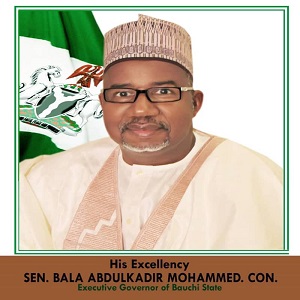
Former FCT Minister Bala Mohammed has been nick-named ‘Mr Roads’ but, while he may yet have his critics, it is important to note that moves to get him back in office come 2023 have begun. Of course, there are arguments that he does not deserve a second chance and making roads alone will not be enough to earn him a second chance.
So far, the Bala Mohammed administration has awarded 29 road contracts in the state.
first one year in office included the Gombe Road to Tirwun- Maiduguri Road Bye-Pass, Sabon Kaura to Miri Bye-Pass and the rehabilitation of Muda Lawal Market Road as well as Nitel Quarters Road in the state capital. All the afforementioned are now completed and await official commissioning even though motorists have since been plying them. Others are Azare Township Road in Katagum local government, Akuyam to Sade Access Road and the 58-kilometre Burga to Duguri roads that are still ongoing. He said the idea is to facilitate easy transportation of people, goods and services in the state capital to reduce traffic congestion and accidents and make Bauchi like the other developed cities in the nation.
Towards the end of 2020, Bala seemed unsatisfied with the number of contracts he awarded on roads construction as he surprisingly sent a N44b supplementary budget to the State House of Assembly to enable him award more road projects. Following that, the dualisation of four road projects at the cost of N13 billion within the state capital (as well as Airport Road from Durum village to the state capital, Awalah round-about to Bauchi State University in Yuli village, Adamu Jumba road and Sam Njoma Road in GRA). Former Senate president, David Mark, flagged off the construction of three rural roads in Warji local government area which is 13.5-kilometre link to Gwaram village and another from Bogoro local government headquarters to Lusa and 11 kilometres from Boi to Lusa villages in the Bogoro local government of the state initiated by Governor Bala. All three roads would cost the state government N7.3 billion. Inside the state capital, a new road from Unguwar Alkali Aminu to Gwangwangwan and Kofar Dumi quarters is currently under construction. Others are from Muda Lawal market to Bakin Kura quarters and from Malam Goje to Bakin Kura, respectively.
Wunti Market and Bauchi Central Market face serious traffic congestions due to lack of befitting parking spaces for buyers to keep their vehicles while at the markets. Other places that require government’s attention are the round abouts in the state capital which are dilapidated, nasty and dirty as a result of lack of renovation and modernisation.
So far, 270 new classrooms have been built, 405 renovated in primary and junior secondary schools across the state. In addition, the construction of 2,500 affordable houses for the poor is currently ongoing in the six emirate councils.
Agriculture:
The state government entered a partnership with CSS Farms Bauchi, to be its skill acquisition partner, to boost the skill set of young people in the state.
The 800-heactare organic farm will train young people in the state on fishery, green-house farming, automated poultry with over 5000 birds, production of over 3000 crates of eggs daily, feed and organic soil production, formulation of independent water and power facilities, hydrophilic farming etc.
Health:
Back in September 2020, the Mohammed administration, the United Nations (UN) and the World Health Organisation (WHO) entered into an agreement as part of the UN’s Delivery as One (DaO) intervention.
The agreement would see over 6.9 million people in the state benefit from the N5.8Bn investment in three major aspects of Nigeria Sustainable Development Partnership Framework, namely; governance, human rights, peace and security; equitable quality basic services (health, education, water and sanitation) and sustainable and inclusive growth and development.
The APC in the state, through its media and publicity committee chairman, Sabo Muhammad, has accused the government of Mohammed of flattering to deceive. “Instead of providing the jobs [it promised during its campaign], the government under the pretext of managing COVID 19 pandemic inflicted hardship on the citizens and crippled businesses through bans on some businesses; some retired civil servants are yet to get their gratuities, serving civil servants have not got their backlogs, there is no existing social welfare programme, amongst other issues.
It must be said that though Mohammed has outdone his predecessor, the roads which he has described as “…a measure of the development of any area”, as “without good access roads, a state cannot be regarded as developed” are not the only things the people of Bauchi want from him.
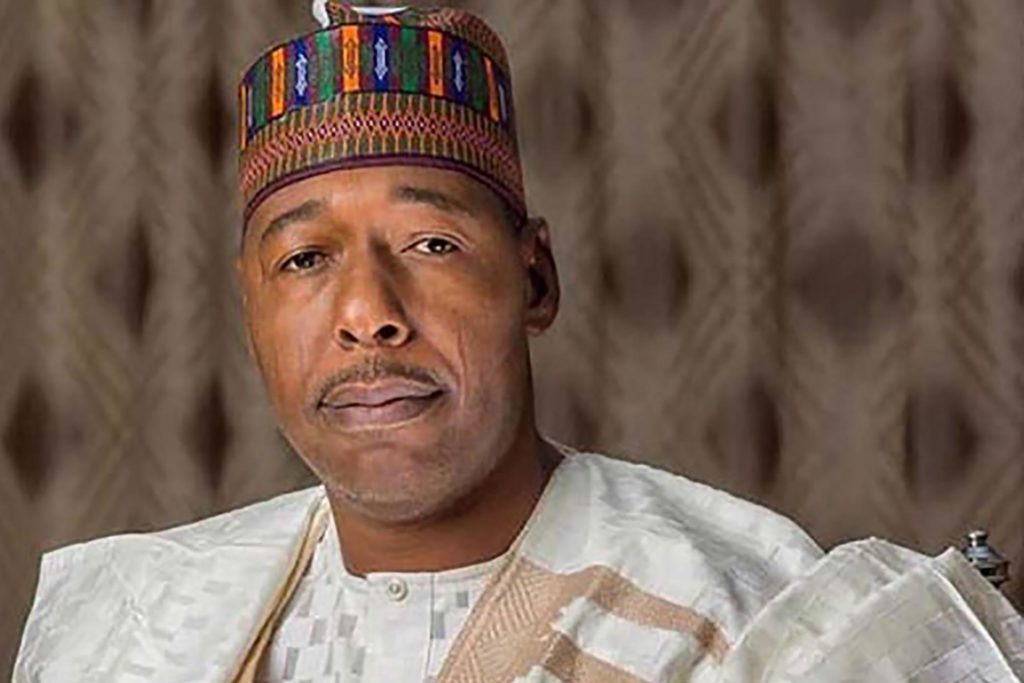
Zulum Trudges on, in spite of Unending Headaches
Professor Umar Babagana Zulum has had his hands full since he took the oath of office. He is putting out endless fires, battling food insecurity, security concerns, taking care of internally displaced persons (IDPs), upholding Maiduguri as the last bastion between Nigeria and the ISWAP, Boko Haram and other entities hoping to gain some grounds in the region by conquering the state.
Security and Resilience Building:
Zulum began his term with a meeting on security issues, one day after he was sworn in as governor, summoning a security meeting comprising the state security chiefs and the traditional institution.
Zulum has visited all the 27 local government areas of the state, where he identified needs, purchased and distributed 300 surveillance vehicles to the military, other security agencies and volunteers in fighting insurgency, as well as procurement of security gadgets for youth vanguards (CJTF), vigilante and hunters.
Zulum has forged ahead with the work began by his predecessor, rebuilding municipal buildings in 21 LGAs (11 of these were newly built across 8 LGAs). The projects include 15 LG lodges, 5 LG secretariats, 32 market shops and 38 market stalls, 8 court complexes/quarters, 14 traditional rulers’ residences (emir, district/village head/bulama), 14 worship centers, 1 shopping complex, 3 LEA offices, 3 police stations, 1 police barrack, 1 administrative office, 1 state secretariat, as well as the furnishing of secretariats in 2 LGAs. Overall, 34 out of 53 instituted projects were completed to show the urgency towards the return to normalcy, and the provision of conducive environment for constituted authorities to administer municipalities.
Humanitarian and Resettlement officer:
In one year of his administration, Professor Babagana Umara Zulum assumed the role of Borno’s Chief Humanitarian Officer, undertaking several humanitarian trips to 14 LGAs severely affected by insurgent-displacement.
In these activities, which are not captured under physical projects, Zulum distributed over 600,000 bags and cartons of food varieties as well as 126,000 pieces of wrappers to displaced women. Zulum was in Niger and Cameroon to support 200,000 refugees from Borno State and is currently building homes in preparation for their safe and voluntary return to Borno State.
The governor approved N1bn as counterpart funding to the Bank of Industry (BoI) to support small and medium-scale entrepreneurs amongst internally displaced and vulnerable persons.
Zulum distributed another N1bn as social protection to a combination of 120,000 female IDPs, 3,127 petty traders, another 3,127 persons with specific needs, another 1,037 vulnerable blind men and women, 28,162 youths engaged in waste-for-cash, following ban on political thuggery and 300 female IDPs who survived gender-based violence supported to start businesses after acquiring skills.
Education:
An academic himself, Zulum has undertaken 76 capital projects in one year, constructing and renovating 21 primary, secondary and sub-tertiary schools across 13 local government areas – including a new, mega 60-classroom primary school at Njimtilo, 30-classroom mega school at Ajilari Cross, one at the Abuja-Sheraton community and another at Askira.
All of these were started and delivered within one year. Six additional schools were delivered while 11 are at various levels of completion. So far, 55 schools were completed, reconstructed, rehabilitated and equipped across the state. Beyond infrastructure, Zulum regularly appears in schools unannounced, takes teachers roll-call and is in full-gear to restore the glory of public-school system in Borno State.
Healthcare:
In his first year, Zulum accorded greater priority to primary healthcare at the grassroots level. He undertook 46 projects, from which 37 new primary healthcare centers (PHCs) were established in 17 local government areas. Of these, 12 new PHCs have been completed while 25 are at various stages. The Zulum administration reconstructed two primary healthcare centers in Tungushe and Walama and rehabilitated the state’s Psychiatric & Skin Disease Hospitals.
Zulum rehabilitated two hospitals in Rann and Lassa and upgraded the general hospitals in Biu and Monguno to ‘specialist’ level. The Umaru Shehu Specialist Hospital was also remodeled. Zulum also established and funded a contributory healthcare scheme to increase access to quality and affordable healthcare services by the people of Borno State.
Rural & Urban Housing:
Within a year of assuming office, 6544 rural and urban houses have been delivered via 21 projects, as well as duplexes for professors, three bedrooms for senior lecturers, two-bedroom for junior staff and a mega hostel for students, all within the Borno State University.
Zulum also delivered 20 bungalows and 50 houses for staff of University of Maiduguri and, on a large scale, completed 500 low-cost re-settlement houses at Ajiri and 250 in Kawuri Township. Currently, 300 low-cost houses are being constructed in Monguno, Guru-Soye, Kawuri village, Auno and Gamdu.
Urban & Rural Water:
Zulum has succeeded in drilling 213 new boreholes alongside distribution lines, in 17 local government areas and rehabilitated 122 dysfunctional boreholes in Jere, Konduga and Maiduguri. He also approved maintenance on 204 existing boreholes within Maiduguri and Jere, bringing the total number of boreholes across 26 LGAs to 539 – they have been collapsed under 25 projects. At different times, Zulum undertook 13 other projects maintaining underground reservoirs at the Low-cost Estate, Alau Raw Water Facility and the Maiduguri Water Treatment Plant, for the benefit of the state’s residents.
Road Infrastructure & Transportation:
To ensure that the state’s economy flourishes Zulum’s administration has revived the agricultural value-chain across 9 LGAs, 26 new projects were instituted and a dozen was completed.
Agriculture:
A mainly agrarian state, until the emergence of the Boko Haram, Borno is caused to shrink. The insurgents have blocked off local governments where people go to fish, conduct business across the border (with Cameroon, Niger and Chad) and farm. The killing of almost 100 farmers in Jere, a suburb of Maiduguri. People dread going to the farms due to fear of attacks from the insurgents.
This has brought about food insecurity, shot up the price of foodstuff etc. The state government, knowing the importance of this, has focused on agricultural revolution across 16 LGAs in the sector which have been completed and delivered – these include cultivation of 3,611 hectares of rice in Konduga, Ngala, Dikwa Mafa, Gubio, Damboa and repair of 56 tractors in Maiduguri, distribution of 350 water irrigation pumps in Biu, Mobbar and other agricultural equipment in MMC; installation of 1500 tons/day rice mill in Jere, and activation of 5 irrigation schemes in Kaga, Jere, Dikwa, Mafa, Ngala, Gwoza Bama and K/Balge LGAs.
Environment:
In collaboration with other partners working on environmental sustainability, all eight (8) ecological projects were delivered across seven (7) LGAs to mitigate the impacts of environmental degradation and desertification. The projects included newly built drainage networks in A/Uba, MMC, Bayo and Jere; and collaborative establishment of 130 hectares of woodlot plantation in six LGAs as well as seedling raising.
Vocational Skills For Job Creation:
The Zulum administration began the vocational training institute in Muna back in 2019. The facility, designed for annual training of 1500 displaced youths above school age, has six (6) blocks of hostels, auditorium, administration block and 14 workshops equipped for training on ICT, tailoring, barbing, auto mobile, electronics, solar and electrical installation, air conditioning and refrigerator, plumbing, pipe works and fiber.
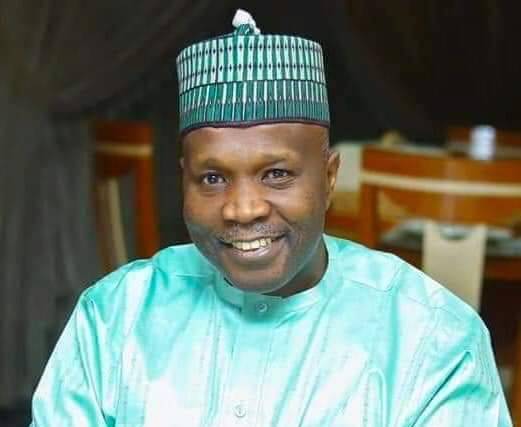
Gombe’s Inuwa Yahaya takes on education, human capital development
Prior to his emergence as governor, it was agreed that anyone who would succeed former governor Ibrahim Hassan Dankwambo would have some huge shoes to fill.
Then came Inuwa Yahaya.
While he has not delved into all the sectors to make a huge splash like his predecessor, he has not done an overly poor job, his minuses notwithstanding.
Education:
In addition to constructing and renovating schools, the Yahaya administration has leaned towards long-term and strategic development of the mind of the students/pupils in the state. Considering the library as the fastest growing means for inducing self-motivation in learning, the State Ministry of Education, through the State Universal Basic Education Board (SUBEB), has undertaken the construction of 110 standard libraries across the State at the total cost of N333million.
So far, the Yahaya administration has constructed 234 new classrooms across 80 schools in the state to enhance enrolment, renovated 190 classrooms across 47 schools to have good learning environment, complete renovation of various infrastructure across 15 schools – hostels, dining halls, staff quarters, laboratories, examination halls and provided classroom furniture to over 120 schools across the state. Others are the establishment of a Teacher Resource Centre (TRC) in Kwami for continuous capacity of teachers, mopping up of about 350,000 out-of-school children and enrolling them into various learning centres established by the highly successful BESDA programme, procured and distributed various instructional materials to about 119 schools across the state and attracted the donation of N150m worth of books and a Science Laboratory complex for GSSS Kaltungo.
Electricity:
The completion of the Dadin-Kowa Hydro-power plant by the Federal Government, which has capacity to generate 40 megawatts of electricity, is a huge plus for the state. The story behind this project is a classic study in leadership and shrewd appreciation of what really counts in the key inter-linked factors for development. The plant was first conceived in 1959 and neglected by successive administrations but Yahaya has capped it all – 60 years after it was first initiated. One special attraction of the Dadin-Kowa hydro-plant is the good thinking behind the 1000-hectres industrial park leveraging on the facility and envisioned to ultimately create a cluster of industries with strong value chain that will create many jobs even with the associated economy of scale
Infrastructure:
Through its ‘Network 1100’, the Yahaya administration hopes to construct 100 kilometres of roads across the 11 local governments in the state to connect 80 per cent of the state’s population (who live in these areas) access to the urban areas.
The procurement of 50 brand new buses for the state’s transport company, Gombe Line, is another landmark initiative aimed at improving inter and intra-state transportation.
The administration’s recently launched 10-year development plan has ear-marked the MSME subsector as an important driver of economic and social advancement, with business registration in the state getting a boost and the Federal Government committing the sum of N1.2b to reach 9085 employees from almost 2000 MSMEs in the educational sector, 10,000 artisans and transporters and almost 6000 new business names registered free of charge with the CAC in the state.
The Yahaya administration has initiated the Gombe Industrial Park project, which was first conceived by the Dankwambo administration. When fully operational the Industrial Park will take advantage of the enormous potentials in hydropower, oil and gas, agriculture and solid minerals resources in the State to accelerate the economic growth of the state.
Road projects executed/ being executed by the administration include the construction of 16km Malala – Zaune – Dukkuyel Road in Dukku LGA, 15km Mararraba – Jabba – Sambo Daji – Pandi Kola – Gwarar – Garin Wada road in Akko LGA, 21km Degri – Bembelem – Reme – Dong – Talasse Road in Balanga LGA, upgrading of 19km Gona – Garko – Gujuba – Kalshingi road with spur to Maidugu in Akko LGA and upgrading of 26km Billiri – Gujuba – Kamu – Awak Road in Billiri LGA.
Other road projects inherited from the past administration include the 11.25km network in Jekadafari North in Gombe LGA, 11.50km Malam Inna – Kurba – Titi Road with spur to Kundulum in Gombe, Y/Deba, Akko and Kwami LGA, 23.53km Gombe Township roads phase VI in Gombe LGA including Dawaki, Madaki, Bolari-East etc.,30km Ladongor – Kwiba – Amtawalam – Pobawure – Sabon Layi – Ayaba road in Billiri LGA,15km Bambam – Tula – Yiri in Kaltungo LGA, the 9.50km Boltongo – Nono Road with spur to Garin Malami in Y/Deba, the 11.50km road taking off from Gombe/Potiskum Federal Highway – Gerkwami – Daniya Road in Kwami LGA, 27km Dukku – Kalam – Dokoro – road in Dukku LGA, 36km Dukku – Dokoro – Jamari Road in Dukku, 9km Bajoga Township Road in Funakaye LGA, 9.10km Bambam – Nwona – Kutare – Yola Road in Balanga LGA, 1.59km road network in rice/vegetable oil Industrial cluster at Nasarawo in Gombe LGA, 13km Kumo – Kalshingi Road in Akko LGA, rehabilitation of 42km Ngaji Buahci – Baure – Zambuk – Lubo – Daban Fulnai Road in Kwami and Y/Deba, 9.9km dualisation of the section of Bauchi Gombe Federal Highway Phase II (Tumfure International Conference Centre) – New City Gate in Gombe and Akko to ease means of transportation and economic activities.
Health:
Upgrading of the Specialist Hospital Gombe to a modern tertiary health facility with state-of-the-art equipment, built and equipped a 12-bed capacity Intensive Care Unit (ICU) in the State Specialist Hospital, revitalised 1 PHC facility in all the 114 wards to provide 24-hour service to the people, completion of internship quarters at the specialist hospital which was abandoned for over 20 years and completion/renovation of Cottage hospitals at Mallam Sidi, Bojude and General Hospital Nafada.
Agriculture:
The administration procured and distributed bags of fertilizer to all the 114 wards across the state for sale to farmers at a record subsidized rate of N5,000 per bag. In all, 19,500 bags of improved seedlings were also distributed for the 2019 dry farming season. Also, the administration built 2 agricultural research centers in 2 LGAs with support from Global Environmental Facility, UNDP and FGN, established farm demonstration and technology adoption plots to train farmers on modern farming techniques and allocated about 3,000 hectares of land for Irrigation farming near Dadin Kowa.
Closely related to the above is that for the first time in over 10 years, a state-wide livestock vaccination campaign was conducted to improve the health of livestock and increase the yield of its products.
The state government allocated the Wawa-Zange grazing reserve for the piloting of the National Livestock Transformation Programme (NLTP), increased budgetary allocation to the agricultural sector in the 2020 budget to allow for the introduction of an all-encompassing agricultural revolution programme in the state. Similarly, the irrigation component of the project would now be awarded by the end of December 2020. The pilot scheme of the irrigation project covers three thousand hectares which will be used for animal production and fisheries. The establishment of fisheries will also provide ample employment opportunities for the youth. Also, the government is set to launch a comprehensive Agricultural Transformation Programme aimed at harnessing the agricultural and manufacturing potentials of the state across all segments of the agricultural value chain through the adoption of innovative and modern solutions and practices.
There have been lots of activities, including the Rural Access and Agricultural Marketing Project (RAAMP) which will construct 700km of rural roads that will open up rural agricultural communities and provide easy access to market for people and their products, drilling of 89 hand-pump boreholes in various rural communities, construction of 27 2-3 classroom blocks in various communities, 44 VIP toilets in various communities, 6 solar-powered boreholes and 6 motorised boreholes, as well as construction and equipping of 23 health centres.
Desertification:
The Yahaya administration engaged and deployed 27,000 youths under the YESSO Programme to nurture the trees being planted under the 3G programme and established nurseries in 5 LGAs and raised about 1.2m assorted seedlings ready for planting in the 2020 raining season. Government further established 100 hectares of woodlot plantations across 5 desert-prone LGAs to combat desertification and land degradation, paid counterpart fund of N500million to a World Bank-assisted project, the Nigeria Erosion and Watershed Management Project (NEWMAP) for the control of 3 major gully erosions in the state.
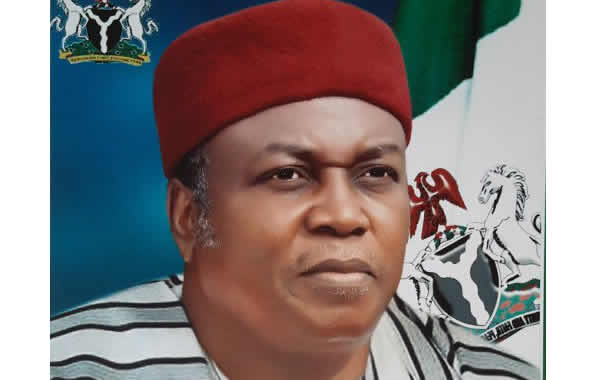
Taraba: Dickson’s clock ticks as he completes a double
Architect Darius Ishaku Dickson started off as Minister of Niger Delta Afairs under President Goodluck Jonathan, before he went on to become the governor of Taraba State.
But, just like other governors in the region, he has had his baptism of fire in the form of herders-farmers’ clashes, Tiv/Jukun clashes, as well as smash-and-grab by bandits in the nether parts of the states.
The violence caused all state structures to collapse. The state was in shambles. Upon resumption of office, the Ishaku administration took the olive branch to all the traditional leaders in warring communities and, it was during his tour that he coined the term “give me peace, I give you development”. It was a true catchphrase.
The first sector to catch up with the recovery plan was the education sector. This recovery has been so rapid and successful that the state has recorded outstanding and unprecedented performances in the West African Examination Council, WAEC examination that it never did in its 26 years of existence. For example, in 2016, the state scored 67.3 per cent in WAEC examination. Before then, the state never exceeded 28 per cent in that examination. In 2017, the state took the eighth position in the same examination. That performance was the best in the entire 19 northern states. To keep the record alive, the governor is still rebuilding and rehabilitating more schools.
The administration has spent billions of naira in the provision of instructional materials. Teachers’ welfare has received tremendous positive attention. Their salaries are paid promptly to get them committed to their jobs. The Ishaku administration recently employed 3,000 teachers in a major recruitment exercise that has taken many qualified teachers off the unemployment queue.
Poverty alleviation through skills acquisition and empowerment of women and youths is a critical part of the Rescue Agenda of the Ishaku administration. This programme has rescued more than a thousand idle young men and women from the poverty bracket. They were trained in various areas and through the skills acquired, they have become not only self-employed but also employers of labour. In addition to the skills they acquired through government-sponsored training programmes, they were also given free start-up equipment to enable them set up their own businesses quickly and properly.
Agriculture is a major emphasis for the Ishaku administration. It has promoted very vigorously wet and dry season farming for various crops, but most especially rice. It has supported farmers through agricultural loans, high yielding seedlings and fertilizer at affordable costs. These very generous farmers support programmes have encouraged farmers to invest more in farming and the results are showing in terms of high and qualitative yields. This has put a lot of money in the pockets of farmers in the state.
Perennial water shortage:
The administration also established its signature project in agriculture, the ‘Green House’ project which the biggest and the best in Nigeria. It is a model farm that employs about 500 people and produces various and special varieties of vegetables that are sold in many department stores in Lagos, Abuja and Port Harcourt. This has reduced dependence of the country on the importation of these products. It was commissioned earlier in the year by Vice-President Yemi Osinbajo who described it as the “best effort in agricultural technology transfer in the country”.
Water is another major area of achievement for the administration of Governor Ishaku. His huge investments in the development of water supply facilities have ended perennial water shortage in Jalingo, the state capital. Water dispensing machines have been introduced in the state which has made water supply not only regular but the cheapest in the country.
The government executed a huge water project to serve the needs of the state capital for the next 30 years.
The rural areas have also benefitted tremendously from the water supply programmes of the administration. In its first year, the administration provided 100 boreholes in 100 communities which have drastically reduced water scarcity in these communities. These communities had previously relied on streams and ponds for water just like their cows and other animals. Another set of 150 boreholes in 150 communities are currently being drilled to further solve the issue around water availability. There are many other bigger water supply projects completed or being executed in all the senatorial zones in the state.
Governor Ishaku’s administration inherited 26 government companies that were moribund. It has successfully rehabilitated six of them which are not only functioning but making profits. The Highland Tea produced in Kakara in the Mambilla area of the state is an example. The company’s product has earned recognition and acceptance in the international tea market. What is required is for the company to increase its output to meet local needs and to enter the international tea market.
Innovative approach to problem-solving:
The health sector in the state has been revived and strengthened to cater for the health needs of the people of the state much better. The School of Nursing and Midwifery which had been shut down for 10 years before the administration came into office was re-opened after the government met all requirements of the Nursing and Midwifery Council which had led to the closure.
Government’s innovative approach in problem-solving led to the recall of retired nurses and midwives to make up for the shortage of these categories of health workers caused by the long closure of the School of Nursing and Midwifery. Three major hospitals in the state, one in each senatorial zone, are being renovated and provided with state-of-the-art facilities to render better services. One of them located in Wukari has already been completed and commissioned by General T.Y Danjuma (Rtd).
The Ishaku administration has also completed and commissioned Kona Road which had rendered Kona, a major town in the state a no-go area for many years. Takum-Katsina-Ala Road and several roads in Jalingo were completed and commissioned in less than two years of the administration. Several roads have been awarded in all the senatorial zones for reconstruction and work on them are progressing.
He has spent more time in office than any other governor in the region. Naturally, this puts him on a pedestal. How has he fared, though?
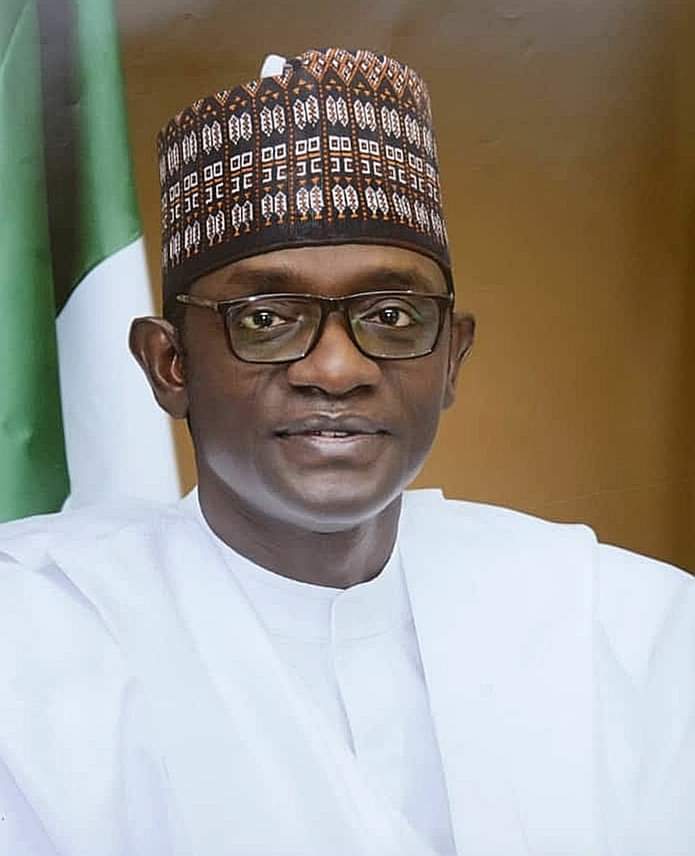
Yobe: Mala Buni strives to make it count
Even before Governor Mai Mala Buni came into office, the state had long been termed one of ‘Nigeria’s most impoverished states’. When Boko Haram, the ISWAP and bandits joined the mix, everything went down-hill. Today, just like most states in the northeastern region, Buni’s administration is trying to make the most of a sad situation.
Education:
Seeing clearly as there are forces bent on strangling education and the love for it across the region, Buni’s administration has made education one of its core concerns. Buni sponsored over 233 Yobe indigenes to study various needed courses in the Nigerian emerging market in the Republic of India. The ‘Buni Scholars’, as they are fondly called will, in the coming years, become medical doctors, medical laboratory technicians, dentistry’s, pharmacists, radiologists, anesthesiologists, engineers etc. Similarly, Buni released the sum of N200 million for the payment of outstanding scholarship for 69 state-sponsored, undergraduate law students to study at various Nigeria Law School campuses across the country.
In the last 20 months, Buni accorded construction of new classrooms, offices and stores one of his topmost priority. The YB-SUBEB constructed and renovated over 200 classroom blocks, 42 offices and stores as well as 75 units of staff quarters (of these, seven model schools of 30 classrooms each in Damaturu, Gaidam, Gashua, Nguru, Potiskum (2no) and Buni Yadi. In addition, constructions of seven Mega schools are currently ongoing). Furthermore, over 14,317 classrooms furniture and 619 units of teachers’ furniture were procured and distributed to various schools across the state while 13 schools where fenced and provided with barbed fences to enhance security, with 17 boreholes drilled in various schools within the state.
Desertification:
In terms of housing, which is explicitly articulated in target 11 of the Sustainable Development Goals and investment in affordable housing will therefore have direct impact on at least 14 of the SDGs. The Buni administration is on course for the construction of 3600 housing units in each of the 17 local government of the state with over 60 percent completion rate and the rehabilitation, expansion and construction of 39 new doctors’ quarters. On the environment, the government understands the negative effect of the climate change; Gov Buni Goal-13 initiative has yielded a positive result to mitigate and adapt with the reality as operation protect the environment constituted, planting of 3 million seedlings to combert desertification in the 17 local government of the state, establishment of 100 hectares of Arabic gum plantation in each senatorial district and distribution of over 600.000 gum Arabic seedlings to farmers.
Furthermore, as part of his efforts for Goal-8: Decent Work and Economic Growth, Goal-9: Industry, Innovation and Infrastructure and Goal-11: Sustainable Cities and Communities, the Buni administration has resuscitated the Yobe Investment Company, constructed a modern market in the busiest Potiskum, Damaturu, Gashua, Buni Yadi and Nguru and created over 50,000 jobs annually through the revival of the following companies; Yobe Fertilizer Blending Company, Yobe Aluminum Company, Woven Sacks Company and the upgrading of the state of the art facilities of Yobe Microfinance Bank. In terms of infrastructural development, Gov, Buni administration has constructed various township roads across the state, including the construction of the 40-kilometre Gujba-Mutai Road.
In ensuring healthy lives and promote well-being for all in Yobe, the Buni administration has constructed a maternal and new-born child health care complex at the state teaching hospital in Damaturu, upgraded all of the health care centers in all wards of the 17 local governments of the state, upgraded Machina and Yusufari healthcare centers to a General Hospital and established the Yobe State Drugs and Hospital Consumables Management Agency (YODMA) the contributory healthcare management agency and subsequent enrolment of 183,403 beneficiaries, establishment of molecular lab for COVID-19 tests, acquiring ventilators for isolation centers, increase 100 per cent monthly allowances for nurse students and construction of 200-bed storey building hostel at the Shehu Sule College of Nursing, among others.
Agriculture is one of the topmost priorities of the Buni administration as the state government trained farmers on production, distributed a subsidised fertilisers and tractors on loan to farmers and partner with Nexim for sesame seed export.
Empowerment of women is a necessity for the development of a society and Gov. Buni generation equality schemes has, so far, trained over 100 women and girls on face mask production, economic empowerment for over 860 vulnerable women across the state, upgrading of women safe spaces in Damaturu and Kukareta, trained women and girls on financial literacy among many other initiatives.
While on Goals 1 & 2, the Buni administration has assisted orphanage schools, almajiris, victims of natural and human disasters and PLWD groups, the Buni Livelihood Project has reached over 100,000 households across the state, among many initiatives through the State Emergency Management Agency (SEMA).
Overall, the office for the coordination of Yobe State Sustainable Development Goals (YSSDGs) action plan has created various schemes, initiatives that touch all of the 17 Global Goals – the Buni Money Agent, Buni Automotive Training, cash support to small business owners, being just some of them.








